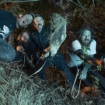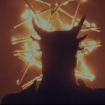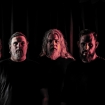Revolver has teamed with Whitechapel for an exclusive splatter vinyl variant of their new album, Kin. It's limited to 500 copies — order yours before they're gone!
When Whitechapel first roared onto the scene with their 2007 debut The Somatic Defilement, the Knoxville, Tennessee crew quickly took their place among the leaders of the mid-Aught's deathcore movement. They secured their legacy over their next five albums — each statement furthered their vicious sonic vision and remained faithful to the band's tried-and-true breakdown-heavy deathcore style. And then came 2019's The Valley.
Whitechapel rolled the dice on their seventh album. They introduced more melodic guitar moments into their sound and singer Phil Bozemen leaned into a cleaner vocal approach (which he first experimented with on 2016's Mark of the Blade) as he delved into dark personal subject matter related to losing both of his parents during his childhood.
On October 29th, Whitechapel will release their next full-length installment, Kin. The new record — which was announced along with the crushing lead single "Lost Boy" — continues down the melodic path Whitechapel started with The Valley, and Bozemen further explores what it means to come to terms with past trauma while not allowing it to define your identity.
When it comes to his own musical inspirations, Bozeman's formative influences were similarly fearless artists that charged headlong into the darkness and weren't scared to take creative chances.
"I don't think any band or artist should ever be pigeonholed to do a certain type of content," he says. "I feel like a good song is a good song regardless who writes it."
Below, Bozeman tells us the stories behind the five records that changed his life and inspired the ever-evolving musical journey he continues to this day with Whitechapel.
Metallica - Metallica
I don't recall the initial time I heard the Black Album. I had heard "Enter Sandman," and that was like the entrance to it … and then I had to hear the rest of it. When I heard "Sad But True," I thought that was like the heaviest thing I'd ever heard. That was the pinnacle for me. That was what [inspired] me to want to listen to heavy metal. I was probably eight or nine when I heard the Black Album … I'm pretty sure it was one of my cousins who had the album. They had a collection of a bunch of CDs, and Metallica was one of the first bands I'd heard that played music like that. That was the beginning of finding out that metal is pretty much my favorite type of music.
The Black Album is just a staple in metal music. It's like their breakout album and catapulted Metallica to where they are today. Of course, their older stuff … Kill 'Em All was metal, but it had punk-rock roots to it as well. Then the Eighties with Master of Puppets and that stuff … But they completely shifted when they got to the Black Album. I think that was when they were like, Okay we're ready to experiment. I think every musician should do that regardless of what they play. If you do the same thing over and over it just gets boring and stale. Metallica were big before, but the Black Album is what catapulted them to prestigious, more mainstream, notoriety.
Pantera - Far Beyond Driven
This was another one that I heard from my cousin's CD collection. I heard "Slaughtered," and I was terrified and thought it was awesome. It was so aggressive and a completely different style of metal. I was terrified and couldn't stop listening to it because I couldn't believe the sounds I was hearing. It was one of those bands that scared me to listen to, but I couldn't stop. Of course it was one of the greatest albums that they ever made. It has tons of classic Pantera songs on it. I think it's probably their most popular album as well.
And the front cover is pretty unsettling: just a skull with a drill going through it. They just had this sound to them … for a young kid it was terrifying. And it was back when that kind of sound wasn't anywhere close to mainstream. It was super underground and just hearing it was a shock factor for me. I heard Far Beyond Driven a little later; I was around 10 or 11 years old. I hadn't had any idea that I would be doing [music as a career]. I just enjoyed the music and never really thought about playing music in a band. [But since that time] Phil Anselmo has definitely influenced me a lot when it comes to doing the extreme kind of vocals.
Cannibal Corpse - Tomb of the Mutilated
I discovered Cannibal Corpse hearing them in Ace Ventura: Pet Detective. That was the ultimate shock factor for me. At the age I discovered them that was the most extreme type of metal to me… they just sounded like monsters. "Hammer Smashed Face" was the first thing I'd ever heard. I was addicted to it. I would watch that movie over and over again just to see that part. I would rewind it and everything. It was pretty insane for a kid that young. I wanted to get that album, but of course my mom wouldn't let me get it. [Laughs]
A lot of this stuff is pretty socially acceptable today. But back then … no one wanted their kids to be seeing anything like that. I mean I'm sure it's probably the same thing today, but we have the internet and access to pretty much anything we want. [Laughs] [Singer] Chris Barnes [became] a huge inspiration — that whole extreme, monster-sounding vocal was what I eventually wanted to do. But I was like, How the hell do they do this! Anytime I tried to do it I just started coughing and had no idea how they were doing it.
Slipknot - Slipknot
I believe I was in sixth or seventh grade when I heard this. I was, again, terrified — but I loved it. Seeing nine people on the front of the cover and they looked like a bunch of serial killers. Then of course the music was … I heard "Wait and Bleed," and it was super aggressive and very dark sounding. And the production on the record — there was just something about it that was very unsettling, very raw and dark to me. Their whole aesthetic was incredible. Scary, but incredible. Back then … no one knew what they looked like or who they were. And people were searching around for photos or anything they could find for them to be unmasked. There was speculation … the whole mystery behind them was just crazy. Corey Taylor [also eventually became] a huge vocal inspiration for me.
Three 6 Mafia - Chapter 1: The End
Three 6 Mafia inspired me with their dark imagery and subject matter along with the fast rapping. I was always drawn to the speed Southern rap usually had. I grew up listening to hip-hop, Southern rap and other stuff that was similar, like Bone Thugs and stuff. That fast Nineties rap from like Louisiana and Texas. Of course, I listened to other stuff like Nas and 2Pac and Biggie. But Three 6 … I had a certain kind of connection to them because they were from Tennessee, and their music, their beats, are so dark and really scary sounding. I was always into the terrifying feeling I got when I listened to them. Their lyrical content is dark, too. I was always drawn to dark imagery and lyricism.
To this day, I love them. "Body Parts" or "Late Night Tip," which was their super-popular song from that record. It's very vibey and dark. They always had that about them. And they come across as very intimidating. Three 6 Mafia also associated with different acts in Memphis and they all kind of like correlate together and feature each other on the albums. They have a bunch of fast rap, and that's where I was really inspired to do fast stuff. To me, Nineties rap is just unmatched.








